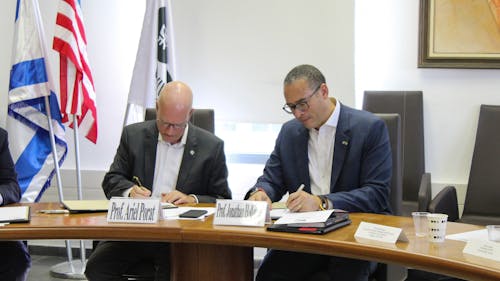DONNELLY-FINE: Rutgers must re-evaluate partnership with Tel Aviv University
Column: Existential Red

Rutgers has for years touted its commitment to social justice as one of the nation’s most diverse institutions of public higher education. The school has provided planning and curriculum centered around the Black Lives Matter movement, an admirable effort to educate students and the community at large about the ongoing structural racism faced by Black people both here in New Jersey and around the country.
And Rutgers has stood with the many immigrant communities that call our great state home, notably refusing to provide immigration status to law enforcement while also offering in-state tuition to undocumented residents who attended high school in the state.
Despite these commitments, when it comes to one of the defining civil rights issues of our time, freedom and self-determination for Palestinian people, our school has been worse than silent. We have been complicit with what an increasing number of human rights organizations are calling an apartheid regime.
Israel’s human rights record has long been a subject of debate, especially in regard to its treatment of Palestinians, programs for which American taxpayer dollars have funded. This treatment of Palestinians has led to reports by international and Israeli groups alleging that Israel is an apartheid state, a label the nation’s strongest critics have long called for.
In its recent landmark publication, Amnesty International described a system in which “Palestinians are systematically subjected to home demolitions and forced evictions and live in constant fear of losing their homes.”
The recent controversy has been sparked by a ruling by an Israeli court that held Palestinian residents of Sheikh Jarrah, a neighborhood of East Jerusalem, would be evicted. This ruling sparked international condemnation and protests, including a protest attended by approximately 1,000 people on the College Avenue campus in May 2021 and organized by Rutgers’ chapter of Students for Justice in Palestine.
But what do these evictions, halfway across the globe, have to do with Rutgers students? This past November, as reported by The Daily Targum, Rutgers formed an agreement with Tel Aviv University (TAU), Israel’s largest institution of higher education, to join the New Jersey Innovation and Technology Hub, a $665 million complex meant to incubate and encourage technological development.
TAU is home to the controversial Institute of National Security Studies, an Israeli think tank that advocated for the “Dahiya Doctrine,” an argument for “disproportionate force and the targeting of civilian infrastructure and buildings,” according to Somdeep Sen, associate professor of International Development Studies at Roskilde University in Denmark.
This doctrine is beyond controversial and informs some of Israel’s most severe tactics, including the bombing campaign in Gaza last year.
The legitimacy and support granted through TAU’s inclusion in The Hub might be minimal compared to the billions in military aid that Congress regularly appropriates. But that is not the only area where Rutgers can and should do more to stand in solidarity with Palestinians living under apartheid.
Following the announcement of the agreement, University President Jonathan Holloway traveled to TAU which is situated in what used to be Al-Shaykh Muwannis, a Palestinian village that was destroyed in 1948.
And more recently in December, Rep. Josh Gottheimer (D-N.J.) spoke at Rutgers Hillel on the College Avenue campus, where he claimed that the organization founded by assassinated Washington Post reporter Jamal Khashoggi had ties to Al Qaeda, while providing no evidence for these allegations.
He was joined during this speech, which was meant to offer support for the Jewish community in the midst of rising antisemitic attacks, by Holloway, who also spoke about the need for Rutgers to serve as a safe haven for students of all faiths and ethnic backgrounds.
Frankly, the University deserves more than talk of mutual cooperation and respect when an institution that we are financially and academically involved with is equally as entangled with Israel and its most condemnable military policies.
We should expect our leaders to stand for justice at home and abroad, just as Rutgers did in 1985 when the university divested from South Africa’s apartheid regime. The Rutgers Coalition for Total Divestment raised the visibility of Rutgers’ hypocritical and unjust investment in South African firms and corporations and, through public demonstration, ended the school’s involvement with the oppressive regime.
I urge students, faculty and administrators to uphold our legacy of righteous activism, to sign this petition calling for the removal of TAU from The Hub and to send a clear message that we stand in solidarity with Palestinians.
Ben Donnelly-Fine is a School of Arts and Sciences junior majoring in philosophy and minoring in history. His column, "Existential Red," runs on alternate Mondays.
*Columns, cartoons and letters do not necessarily reflect the views of the Targum Publishing Company or its staff.
YOUR VOICE | The Daily Targum welcomes submissions from all readers. Due to space limitations in our print newspaper, letters to the editor must not exceed 900 words. Guest columns and commentaries must be between 700 and 900 words. All authors must include their name, phone number, class year and college affiliation or department to be considered for publication. Please submit via email to oped@dailytargum.com by 4 p.m. to be considered for the following day’s publication. Columns, cartoons and letters do not necessarily reflect the views of the Targum Publishing Company or its staff.



